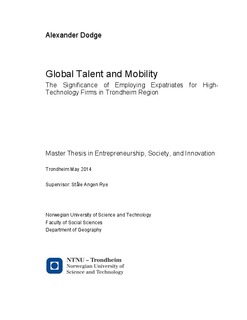Global talent and mobility : the significance of employing expatriates for high technology firms in Trondheim Region
Master thesis
Permanent lenke
http://hdl.handle.net/11250/300702Utgivelsesdato
2014Metadata
Vis full innførselSamlinger
- Institutt for geografi [1023]
Sammendrag
In 2010 the municipal authorities in Trondheim Region approved a strategic development plan to increase the region’s share of national GDP in Norway. One of the goals in the plan included that the region would be the most attractive city region in Norway. Underneath this goal was a strategy that Trondheim Region will be better to retain foreign workers that settle in the region. Tekna Magazine published that around 15,000 foreign engineers work in Norway, at the same time a labor market report from NAV stated that there was a shortage of 4200 engineers in Norway in 2012. In Trondheim Region, the technological industries have doubled in size since 2006 and have recruited a large number of foreign engineers, or expatriates, as a result.
This thesis asks why is it significant for high-technology companies in Trondheim Region to hire expatriates. In this report three international high-technology companies of varying sizes are investigated in order to find how global markets, skill shortages, knowledge management, and innovation are connected with the hiring of expatriates. The thesis argues that hiring expatriates is significant because it is a means of investing in new innovation activities in Trondheim Region despite skill shortages. Expatriates are significant for further growth and development for hightechnology firms located in Trondheim.
Nevertheless the expatriates themselves are also dynamic actors whom have backgrounds and experiences in which have implications for company organization and strategy. The thesis also asks how expatriates themselves influence company organization and strategy. It is argued through theory and empirical evidence that diversity in an organization can contribute to creative processes in groups, but on the other hand can also create conflicts in groups. However this is not only a cross-cultural management issue, but also a knowledge management issue. It is noted that
expatriates can contribute most to creativity the longer they stay in the company. Yet there is a process of settling in a new country for the expatriates that has implications for their decision to stay or leave Norway. As it is in the best interests of the company to retain these employees, the company should therefore develop a strategy around the settlement process of employed expatriates and their families.
